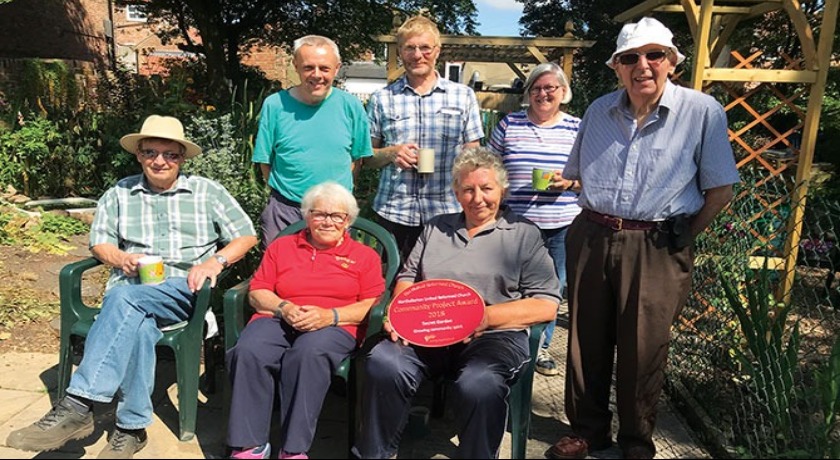 Applications for the United Reformed Church (URC’s) 2021 Community Awards are now open.
Applications for the United Reformed Church (URC’s) 2021 Community Awards are now open.
Supported by Congregational Insurance, the awards recognise innovative community projects taking place across the denomination. To be eligible, the project must be run in the UK by members of a URC congregation or by a Local Ecumenical Project involving a URC. Entry forms can be downloaded here.
Because of the closure of church buildings and projects due to coronavirus, the 2020 Community Awards have been postponed until 2021 as judges have been unable to visit shortlisted projects. Judging will resume when lockdown is lifted.
In the November’s edition of Reform magazine, Stephen Tomkins, Editor, interviews members of The Secret Garden, a 2018 award-winning community gardening project attached to Zion URC in Northallerton, North Yorkshire. The article can be read below.
Time to Grow
Liz Styan had long had hopes for two plots of waste ground neighbouring her church, Zion United Reformed Church in Northallerton, North Yorkshire, especially as the church had qualified as an Eco Church.
The land was overgrown and covered in broken glass and needles. Nothing happened for years, but then in 2015 the owner of one of the plots happened to bemoan its condition to a former elder of the church, just as Liz was taking early retirement as a GP. He said: “I’ve got just the woman for you.”
Once both landowners had agreed to the project, Liz, her husband and a group of friends cleared and cultivated the land to create a beautiful community garden for local people to help with and enjoy. The project brought together the church’s ecological commitments with Liz’s medical background.
“It’s about the importance of the natural world and God’s provision through the earth, and knowing that people’s wellbeing doesn’t come out of a bottle,” Liz says. “They might get ten minutes of me in consultations; what they really needed was contact with other people and with the earth, meaning and purpose, opportunities to belong and to give, and exercise and to be outside. All of those lovely things that you can’t offer as a GP.”
The Secret Garden opened for gardening sessions for about ten volunteers, twice a week. As well as flowers and shrubs, they grow fruit and vegetables: onions, beans, cucumbers, strawberries, raspberries, gooseberries, potatoes, peas. Volunteers deliver some of the produce to a foodbank and a women’s refuge.
Other regular users of the garden have included the church’s Way In group, which offered coffee and a biscuit on Northallerton’s twice-weekly market days. A forest school for preschool children met there two days a week.
Many others used the garden on occasion: schools, Rainbow, Cub and Girl Guiding units, and the church itself used it for parts of its services. The Help for Heroes military veterans’ recovery house in Catterick has held sessions there for photography and poetry. A woman used the garden for mosaic making courses. A group of people who have been long-term unemployed worked with the Secret Garden for six months to create a fundraising stall and open day. Secret Garden has registered with the Quiet Garden Trust and held three quiet retreat days, largely attracting people from outside the church.
Winning joint first prize in the 2018 Community Awards, the team was able to convert a large, decrepit garage into a safe shed. Liz reports that it also eased the project’s constant fundraising, and gave volunteers a sense of pride that their efforts had been recognised.
While lockdown has prevented many community projects from functioning, the Secret Garden has come into its own. The church has used the garden much more than previously, as a safe way to meet. When lockdown began, Liz and her husband maintained the garden alone, but through the sunny, dry summer, it needed more watering, which provided an opportunity to bring the volunteers back for weekly solo sessions. In June, gardening for groups of six resumed. And, although the church has not been able to restart its Way In sessions, it has been replaced for now with ‘The Other Way In’, which happens in the garden.
A local Churches Together project, the Living Rooms, started months before lockdown began, offering a drop-in centre where ‘it’s OK not to be OK’. Unable to meet indoors, they have had two garden sessions a week, in three groups of six, providing a vital opportunity to talk.
One of the volunteers says: “There have been therapeutic, social, educational and health benefits, with being outside and breathing in the air and seeing nature – the best tonic I can think of.’ Another says: ‘Almost immediately, we fell under the disarming spell of the glorious, ever evolving flora and melodious birdsong that greeted us. The calming effect of the tranquillity was immediate.”
The great benefit of such a church project, says Liz, is that “it creates links with the community at a completely different level. It’s not about doing good to other people, it’s discovering things together. It’s not holy, there’s nothing threatening about it. It just provides a lovely space for welcome and engagement and wellbeing and looking after the earth. It’s a magical place. It gives life to me, but it also gives life to many other people, which is incredibly humbling.”
Image: Members of the Secret Garden.
Published: 23 November 2020




